🐌🐌Vivir el presente: lo que aprendí viendo Memorias de un Caracol🐌//🐌Living in the present: what I learned from watching Memoirs of a Snail🐌🐌
¡Hola nuevamente, yo por aquí! Hoy quiero compartirles una película que jamás pensé ver. Como muchos saben, soy fan del suspenso y el terror, y este tipo de historias no suelen ser mis favoritas. Confieso que le huyo a las películas que hacen llorar y tocan temas reales y duros, de esos que muchas personas viven día a día.
Hello again, me over here! Today I want to share with you a movie that I never thought I would see. As many of you know, I'm a fan of suspense and horror, and this kind of stories are not usually my favorite. I confess that I run away from movies that make you cry and touch real and hard topics, those that many people live day by day.

Pero esta vez, vi “Memorias de un Caracol”… obligada (¡jajaja, tenía que confesarlo!). Fue elección de mi novio, que siempre le da oportunidad a películas nuevas. Y la verdad es que me sorprendió tanto, que sentí la necesidad de venir a contarles por qué vale la pena verla.
But this time, I watched “Memories of a Snail ”... forced (hahaha, I had to confess!). It was my boyfriend's choice, who always gives new movies a chance. And the truth is that I was so surprised, that I felt the need to come and tell you why it is worth watching it.

La historia es una especie de autobiografía narrada por la protagonista, Gracie, que nos lleva por cada etapa de su vida. Desde el nacimiento, ya todo fue complicado: ella y su hermano vinieron al mundo al mismo tiempo que su madre murió en el parto. Además, nació con una malformación en el labio, lo que le dejó una cicatriz visible. Su padre, alcohólico y en silla de ruedas, apenas podía cuidar de ellos.
The story is a sort of autobiography narrated by the protagonist, Gracie, who takes us through each stage of her life. From birth, everything was already complicated: she and her brother were born at the same time her mother died in childbirth. In addition, she was born with a malformed lip, which left her with a visible scar. Her father, an alcoholic and wheelchair-bound, could hardly take care of them.
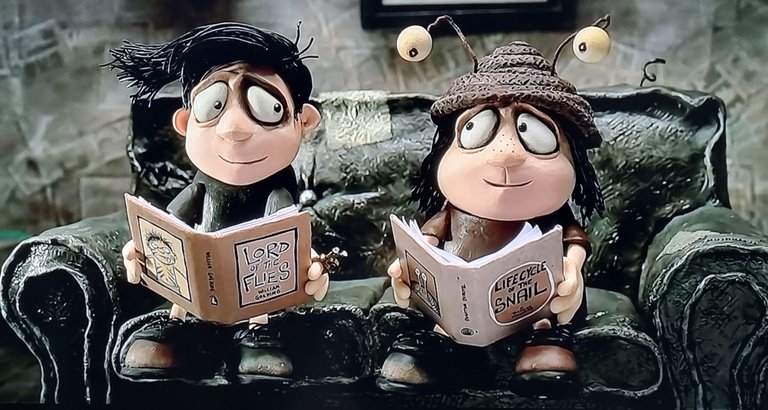
A pesar de todo,—Gracie— era una niña increíblemente empática, incluso con personas sin hogar. Amaba a su hermano, quien tenía una obsesión por jugar con fuego. También tenía una fascinación especial por los caracoles: los coleccionaba y encontraba belleza en ellos, como una metáfora de su vida.
Despite everything, Gracie was an incredibly empathetic child, even with homeless people. She loved her brother, who had an obsession with playing with fire. She also had a special fascination with snails: she collected them and found beauty in them, as a metaphor for her life.
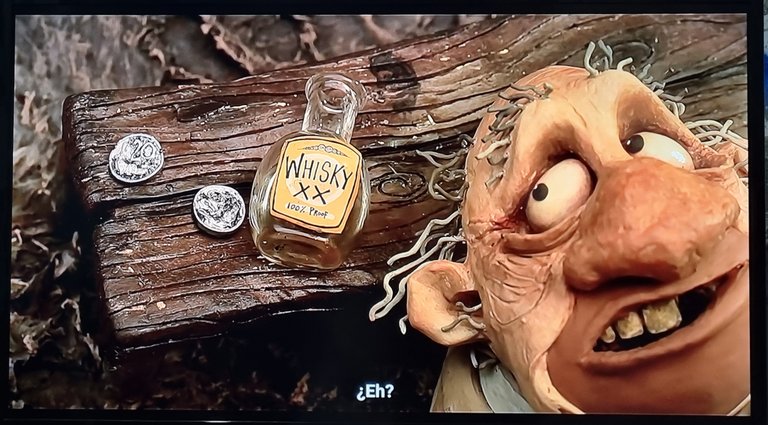 |  |
|---|---|
 | 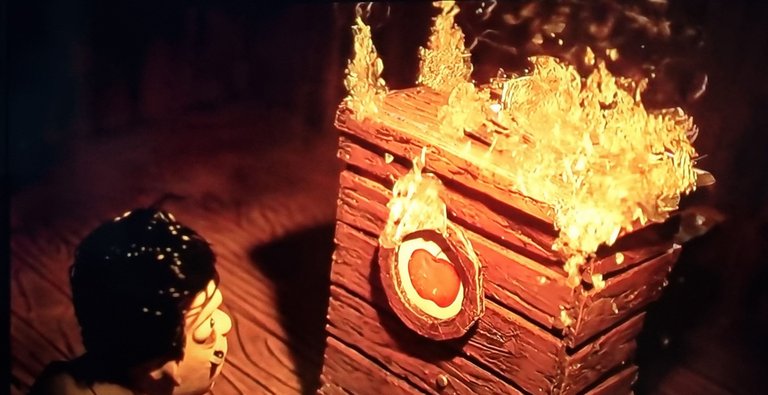 |
Con el tiempo, su padre muere y ambos hermanos son separados al ir a casas adoptivas distintas. Él termina en un hogar muy religioso y opresivo, y ella en uno más liberal. Lamentablemente, su hermano no tiene un buen destino: tras un incidente con fuego, muere en un incendio, encerrado por su madre adoptiva.
Eventually, their father dies and both siblings are separated by going to different foster homes. He ends up in a very religious and oppressive home, and she in a more liberal one. Unfortunately, her brother does not have a good fate: after a fire incident, he dies in a fire, locked up by his adoptive mother.


Ese momento parte en dos la vida de la protagonista.
That moment splits the protagonist's life in two.
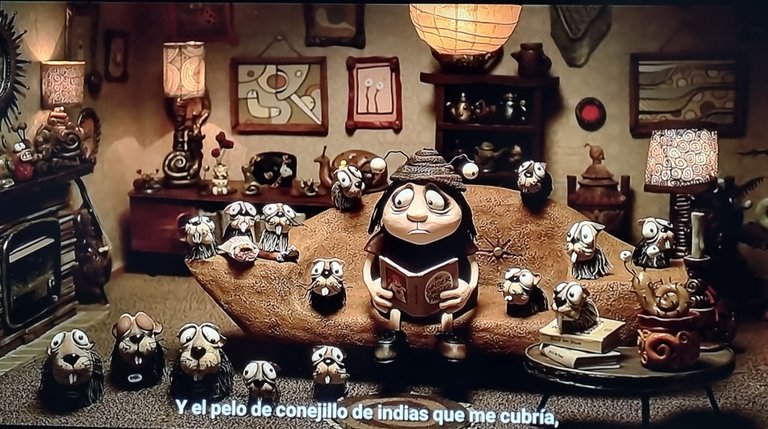
A lo largo de los años, ella intenta reconstruirse. Se casa, pero su esposo, en vez de ayudarla, la alimenta compulsivamente hasta hacerla obesa, movido por un fetiche personal. Cuando se da cuenta de que la estaba dañando bajo el disfraz del “amor”, lo deja.
Over the years, she tries to rebuild herself. She marries, but her husband, instead of helping her, compulsively feeds her until she becomes obese, driven by a personal fetish. When she realizes that he was harming her under the guise of “love,” she leaves him.
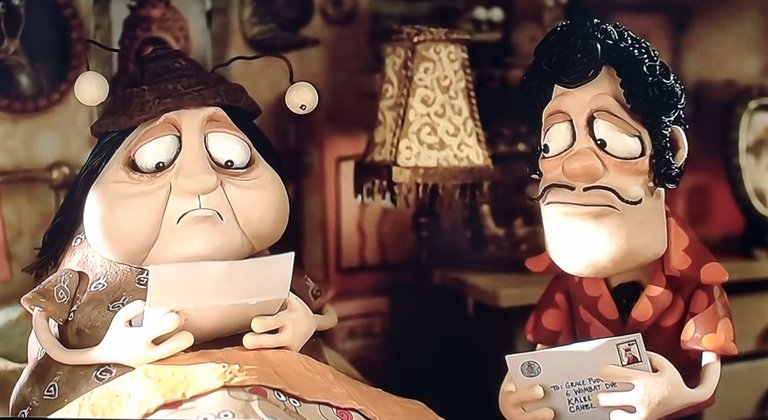
Ya sin familia, sin su hermano, y tras la muerte de su última amiga, se encuentra completamente sola. Pero en esa soledad, recibe una carta que le deja su amiga antes de morir. Y ese momento… simplemente me rompió y me sanó al mismo tiempo.
Without her family, without her brother, and after the death of her last friend, she finds herself completely alone. But in that loneliness, she receives a letter left to her by her friend before she died. And that moment... it just broke me and healed me at the same time.

En la carta, su amiga le recuerda que no debemos vivir anclados al pasado, aunque sea parte de quienes somos. Que el futuro es incierto y no podemos controlarlo. Pero que el presente sí es nuestro, y es ahí donde debemos aprender a vivir, con lo bueno y lo malo.
In the letter, your friend reminds you that we should not live anchored to the past, even though it is part of who we are. That the future is uncertain and we cannot control it. But the present is ours, and that is where we must learn to live, with the good and the bad.

La protagonista limpia su habitación, se desprende de las cosas que había acumulado, y entiende que no tener a alguien al lado no es el fin del mundo. Comienza a vivir, a sentirse plena, a construirse desde ella misma. Y la frase que más me marcó fue esta:
The protagonist cleans her room, gets rid of the things she had accumulated, and understands that not having someone next to her is not the end of the world. She begins to live, to feel full, to build herself from herself. And the phrase that most marked me was this one:
“Un caracol nunca vuelve por donde ya pasó. Siempre deja huella, pero no las pisa nuevamente.”
A snail never returns where it has already passed. It always leaves a trace, but it does not step on them again.
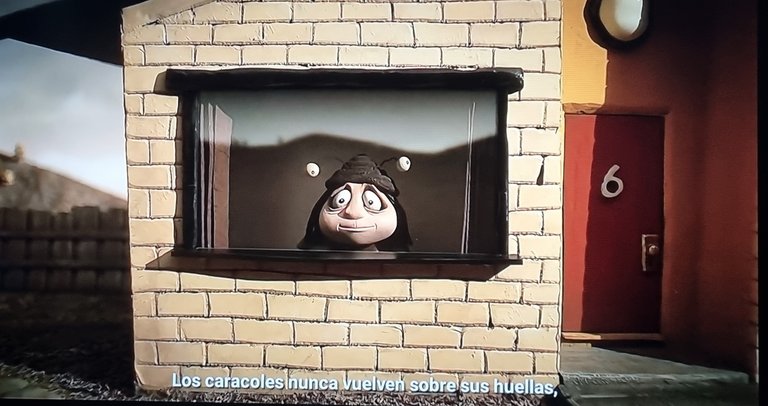
Esa frase lo dice todo. No se trata de olvidar el pasado, sino de avanzar sin quedarnos atrapados en él.
Al final, me alegra profundamente por ella. Pasó por tanto: fue abandonada, abusada, traicionada, perdió a su hermano, a su amiga, su ilusión del amor… y aun así logró reencontrarse consigo misma y comprender que la primera persona que debía amarla era ella. Porque no podemos basar nuestra felicidad en si tenemos o no ciertas personas o cosas. Estamos aquí para vivir, para sanar, para evolucionar.
That phrase says it all. It's not about forgetting the past, it's about moving forward without getting stuck in it.
In the end, I am deeply happy for her. She went through so much: she was abandoned, abused, betrayed, lost her brother, her friend, her illusion of love... and yet she managed to find herself again and understand that the first person who should love her was her. Because we cannot base our happiness on whether or not we have certain people or things. We are here to live, to heal, to evolve.

Y aunque sea una película animada, va dirigida a un público adulto por la complejidad de sus temas. La recomiendo con el corazón en la mano.
Gracias por leerme, como siempre. 💛
Nos vemos en el próximo post
And although it is an animated film, it is aimed at an adult audience because of the complexity of its themes. I recommend it with my heart in my hand.
Thanks for reading me, as always. 💛
See you in the next post.
Creditos: portada realizada en PicsArt app con fotos tomadas con mi teléfono a la película// Resto de las fotos, tomadas con mi telf a la película// Traductor Deepl.com
Me parece que es una película súper interesante y con un mensaje potente. Apenas ví tu post me llamó la atención por ser stop motion, y por como describes todo con lujo de detalles haces que realmente provoque ver la película completa. Me gustó mucho tu reseña 💞
Gracias por leer 🩷🩷 la verdad es una película hermosa. Creo que esa es mi parte favorita de ellas, el mensaje que nos dejan... espero te animes a verla 🩷
Ya el hecho de haber sido hecha con ese tipo de animación, me atrapó. El tema, bastante profundo, y ahí difiero, es no solo para adultos, sino también para que inconscientemente, los niños interioricen sobre el amor propio.
Si el tema toca temas profundos y de gran aprendizaje. Por su puesto que los niños pueden aprender de ello, pero la película tiene unas escenas que a mi parecer es necesaria la supervisión de un adulto... nuestros niños les surgen preguntas como porque el señor la quiere obesa y porque toma fotos de ella desnuda o ¿qué es un fetiche? No se jajaja solo es mi punto de vista
Este post ha sido votado y curado por el equipo Hive Argentina | Participa en nuestro Trail de curación.
Únete a nuestro Trail Aquí.
Puedes hacerlo también en nuestros enlaces preconfigurados de Hivesigner:
| 10 HP | 25 HP | 50 HP | 100 HP | 250 HP | 500 HP | 1000 HP | 1500 HP | 2000 HP |